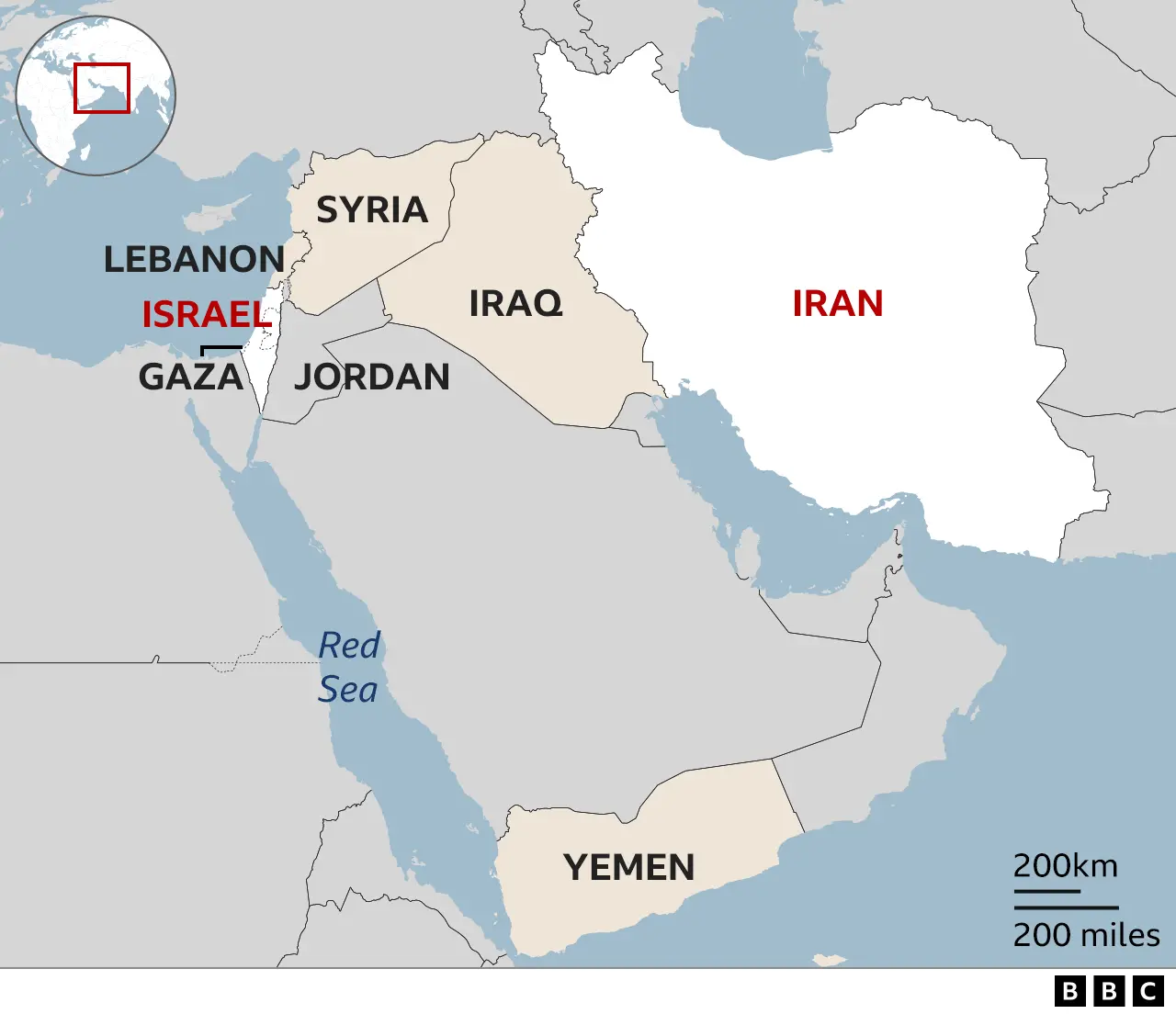September 28 2024
WAR IN THE MIDDLE EAST?

1 Summary of recent Israel-Lebanon developments
2 Israel kills Hizbollah chief Hassan Nasrallah in massive strike on Beirut
3 History of Israeli’s neighborhood
4 Map of theater of conflict
5 Potential for escalation to WWIII
1 Summary of recent Israel-Lebanon developments
Israel has a long history of being outnumbered by its Arab neighbors but managing to defeat them in key conflicts. Currently, Israel is engaged in a war within its own territory, focusing on the Gaza Strip. However, tensions have escalated with Lebanon, Israel's northern neighbor. Yesterday, Israel conducted an airstrike that killed the leader of Hezbollah, a powerful militia backed by Iran and seen as Lebanon’s enforcement arm. This strike is comparable to the United States' killing of Osama bin Laden, as it decapitates the organizational structure of Hezbollah, much like bin Laden's death impacted al-Qaeda.
2 Israel kills Hizbollah chief Hassan Nasrallah in massive strike on Beirut
A NYT
Hezbollah on Saturday confirmed the death of Hassan Nasrallah, its longtime leader, in an airstrike on the organization’s underground headquarters near Beirut, hours after Israel said he had been killed. Israeli forces had launched a series of airstrikes in the Hezbollah-dominated area known as the Dahiya that it said were intended to destroy Hezbollah weapons caches. An Israeli evacuation order ahead of the strikes sent more residents fleeing in search of safety and contributed to a deepening sense of dread in Lebanon. The death of Mr. Nasrallah is a major escalation in Israel’s rapidly expanding campaign against the Iran-backed group, two weeks of back-and-forth attacks that have threatened to spiral into an all-out regional war. Ayatollah Ali Khamenei, Iran’s supreme leader, had condemned the Israeli strikes in a statement earlier on Saturday, but did not mention Mr. Nasrallah. “All the resistance forces in the region stand with and support Hezbollah,” he said. Beirut was gripped on Saturday by a feeling that the capital was no longer safe after months of Hezbollah clashes across the country’s remote border with Israel. Thousands of people from outside Beirut spent the night sleeping on the streets and beaches of the capital.
B FT
Israel has killed Hizbollah’s leader Hassan Nasrallah in a massive strike on Beirut, in the latest in a series of devastating blows to the Lebanese militant group. The strike in a densely populated residential neighbourhood in southern Beirut was part of an intense bombardment carried out by Israeli forces over the past 24 hours, and capped a dramatic escalation of Israel’s offensive against Hizbollah. Hizbollah confirmed Nasrallah’s death in a statement on Saturday, saying he had joined the group’s long list of “martyrs”. The group said its leadership would continue to battle against Israel “in support of Gaza and Palestine, and in defence of Lebanon and its steadfast and honourable people”. Herzi Halevi, chief of the general staff of the Israel Defense Forces, said on Saturday that the strike did not mark the conclusion of Israel’s operations. “This is not the end of our toolbox,” he said. “The message is simple: anyone who threatens the citizens of Israel — we will know how to reach them.” Israel claimed the strike had also killed the head of Hizbollah’s southern front, Ali Karaki, and other senior commanders. It was the latest in a succession of debilitating Israeli attacks on Hizbollah’s chain of command. At least six people were killed and 91 injured in the strike, Lebanon’s health ministry said on Friday. That figure was expected to rise as rescue workers continued searching for survivors. Iran’s supreme leader Ayatollah Ali Khamenei said that the fate of the Middle East “will be determined by resistance forces, the foremost of which is Hizbollah”. He added that the group’s “solid structure cannot be significantly damaged” by “Zionist criminals” who he said had demonstrated their “short-minded and stupid policies”. He urged all Muslims to stand by Hizbollah in its fight against “an occupying and vicious regime”. Nasrallah’s death caps a disastrous two weeks for Hizbollah during which it has sustained the heaviest succession of blows in its four decades of existence.
Article Source: NYT, FT
3 History of Israeli’s neighborhood
In 1948, following the United Nations' partition plan, Israel declared independence, sparking the Arab-Israeli War as neighboring Arab states (Egypt, Jordan, Syria, Lebanon, and Iraq) launched attacks to prevent the establishment of the Jewish state. Despite being outnumbered, Israel secured victory and expanded its territory. In 1956, during the Suez Crisis, Israel allied with Britain and France to briefly seize the Sinai Peninsula from Egypt. The 1967 Six-Day War saw Israel launch a preemptive strike against Egypt, Jordan, and Syria, capturing the West Bank, Gaza Strip, Golan Heights, and Sinai Peninsula. In 1973, during the Yom Kippur War, Israel faced a surprise attack by Egypt and Syria but ultimately repelled the offensive. Israel's military successes solidified its position as a dominant regional power in the Middle East.
4 Map of theater of conflict

5 Potential for escalation to WWIII
An Israeli war with Lebanon could quickly escalate due to Hezbollah’s close ties with Iran, which provides the group with financial and military support. Should Israel's conflict with Hezbollah intensify, Iran may directly intervene to protect its proxy, either through missile strikes or by mobilizing allied militias across the region. This could draw in the United States, which has a strong alliance with Israel and could provide military aid or engage Iran to prevent further destabilization. In turn, Russia, which maintains a strategic partnership with Iran and influence in Syria, might support Iran diplomatically or militarily to counter U.S. actions. This chain of events could turn a regional conflict into a broader confrontation between global powers, heightening the risk of a larger war in the Middle East.
Sources
2. A https://www.nytimes.com/live/2024/09/28/world/israel-lebanon-hezbollah-hamas/here-are-the-latest-developments-on-strikes-in-lebanon?smid=url-share
B https://on.ft.com/4dm96zL
